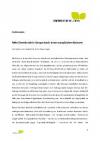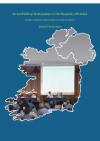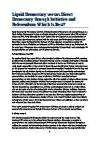Pressekontakt
Wir beantworten gerne Ihre Fragen und vermitteln Interviewanfragen.
press[at]democracy-international.org
Telefon: +49 2203 102 14 75
Lesen Sie Stellungnahmen und Analysen zu demokratiepolitischen Entwicklungen.

This paper published by the European Citizen Action Service (ECAS) in September 2013 describes the main obstacles and issues that ECI organisers face before and during the process of launching and implementing an ECI.

On 26 January 2014, the Constitutional Assembly of Tunisia adopted a new Constitution. Our academic scientiest Dr. Klaus Hofmann has analysed the new legal text in view of its separation of powers and (direct) democracy.

Ivailo Georgiev, member of Democracy International, sheds lights on the recent developments in Bulgaria and explains about the high thresholds that hinder Bulgarian citizens from effectively participating in direct law-making.

Democracy International, gemeinsam mit einem großen Bündnis von Partnerorganisationen, fordert in einer breit angelegten Kampagne einen europäischen Konvent ein.

Direct democracy has emerged in discussions on political and institutional reform in Ireland. Donal O'Brolchain looked back into the history of the Irish constitution and makes a case for introducing the citizens' initiative.

In his article, Nijeboer argues that the attractive features of Liquid Democracy (LD) are already incorporated in modern direct democracy systems in the form of initiative and referendum but LD has also some clear weaknesses.

This briefing contains 2 essays. The first one focus on the progress made by the ECI. The second one feautures the initiative "Right2Water", the first ECI that gathered the one million required signatures.

After the big financial crisis, Iceland has the potential to reinvent itself. A total revision of the national constitution has been launched and a first draft presented in July 2011. All these elements were good reasons to visit Iceland.
In this paper Antonios Bouchagiar and Mihalis Gousgounis, both lawyers register in Brussels, describe from a historical and legal perspective the forms of direct democracy which have been limited to national referenda in Greece.
